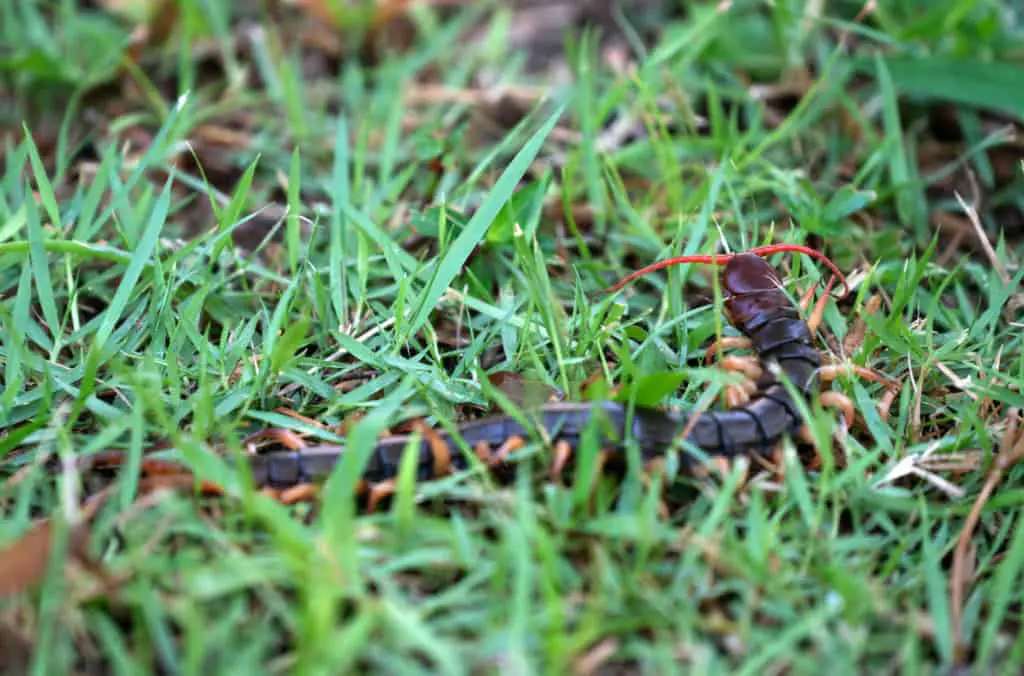After being asked by many customers if LED lights attract bugs and other insects, this article continues with the theme of earlier posts where I break down if certain types of bugs really are attracted to lights. This is the turn of centipedes and in this article, I look to investigate if LED lights attract centipedes? Hope you enjoy what I found, it certainly surprised me!

A common misconception is that lights attract centipedes, homeowners often hope that keeping their lights off will discourage them from entering a room. This myth has been going around for years, so this blog post will finally correct all these misconceptions and provide useful tips on getting rid of them.
As we will see, the question Do Led lights attract centipedes? depends upon whether you are referring to the colour of your lights or if you leave a night light on.
Do LED Lights Attract Centipedes?
Many people mistakenly believe that centipedes are attracted to lights as they are often seen near light sources at night. The reason for centipedes heading towards light sources is to prey on the bugs and other insects attracted towards these same lights.
In fact, I discovered from my research that centipedes do not like bright lights or direct sunlight. They are nocturnal, so they will generally try to avoid light as much as possible as they can suffer dehydration! Centipedes are not the only animals attracted to the lights in search of prey, spiders also hunt in this way.
If you have centipedes hiding in your home during the day, this is because the lights from your home at night attract them (either it provides a source of heat or the insects attracted by the lights). Also, if you have any areas of your home that does not get any direct sunlight, you should make sure to keep those areas well lit at all times so that any centipedes hiding there will not be able to survive.
That’s also the reason why centipedes like to hide in dark places where they can find moisture, so while they may be attracted to light sources in search of food, they are more likely to hide in damp areas such as basements or bathrooms.
Plus, Centipedes are carnivorous, meaning they eat other insects and eat worms and slugs, so if you leave food out in your house overnight (like fruit or bread), this could attract bugs that could then also attract centipedes.
Why Are Centipedes Attracted to LED Light?
Like many insects and arachnids, centipedes are attracted to light, especially outdoor lighting. As mentioned above, this is because there is more potential prey for them in the form of insects and other arthropods that are also drawn to lights.
The attraction to these lights by other insects, such as cockroaches, also has something to do with the fact that lights offer warmth, which is a survival need for the often cold-blooded creatures. That’s why centipedes are often attracted to other sources of heat and warmth, such as houses and buildings because they provide shelter and protection from extreme weather conditions.
I also discovered that the fact that LED light has a higher UV component probably makes centipedes more drawn to it than any other light. It could also be the fact that LED lights do not burn as hot as traditional incandescent bulbs.
Also See: Do LED Lights Attract Mosquitoes?
Which Light Colour Do Centipedes Hate?
Centipedes hate blue light and are attracted to green and yellow light. White and red light is less effective in repelling centipedes than blue. If you have blue light inside and green or yellow light outside your home, this will work well to repel pests away from your house.
Centipedes do not see the blue light as something that can be harmful to them or can cause pain. However, all these lights can cause the centipedes to take a long time before making a move. And while blue lights may not attract the centipedes, other factors play a role in attracting them. You can purchase blue lights on Amazon linked here (opens new tab)
Since centipedes love places that are moist, dark, and damp, they will likely hide under things like rocks, leaves, and mulch. If you have a lot of these things spread around your house, don’t be surprised if you find more centipedes than usual inside your home. Also, if you live somewhere where it rains a lot and the atmosphere is humid most days of the year, then expect more centipede activity in or around your home.
Are Centipedes Dangerous?
Centipedes are venomous arthropods that can kill their prey by injecting venom with their fang-like mouthparts. However, the venom of most centipedes is not very strong and can only kill small prey such as insects or spiders. Therefore, most centipedes are not poisonous to humans, but a few can inflict painful bites.
For example, a larger centipede’s bite is more painful and requires medical attention. Some centipedes in the family Scolopendridae (tropical centipedes) can grow as large as 12 inches in length (30 cm) and produce a painful bite comparable to a bee sting.
People stung by a house centipede often mistake it for a bee sting at first because the bitten area is swollen, and the pain is sudden and sharp. The pain from a centipede bite should subside within 15 minutes or up to an hour if you were bitten on the hand or foot.
So, even though centipedes bites do not cause any health complications to humans, they can still be uncomfortable. Thankfully, a centipede bite is relatively rare unless they are provoked. Most centipedes bite when they are accidentally squeezed or stepped on, so your risk of getting bitten is even lower if you leave this pest alone and don’t try to pick it up or touch it!
How to Get Rid of Centipedes?

LED lights may help keep centipedes away. They are less likely to be attracted to LED lights because they are brighter and produce little heat. LED lights will not attract as many insect pests, reducing centipede populations. Speaking of lights, avoid using fluorescent lamps or other energy-efficient bulbs that could attract them.
Another easy way to get rid of centipedes, even if it seems a little harsh, is by using a vacuum cleaner every day or two to remove them from your home. If you see centipedes in your home, chances are that other pests may be present that they’re feeding on.
Centipedes often eat spiders, ants, silverfish, and other common household bugs that you might find around your home, so you can use pesticides containing pyrethrin, bifenthrin, or permethrin to kill other pests that they are preying on.
Conclusion
In summary, centipedes are nocturnal insects, so they are not attracted to LED lights and will generally stay away from light if possible unless they are searching for food. In this case, if you keep your home well-lit with lights that they are less attracted to, such as brighter and lower heat dissipation LED lights (or even coloured lights) this should limit the number of centipedes that come out at night.

